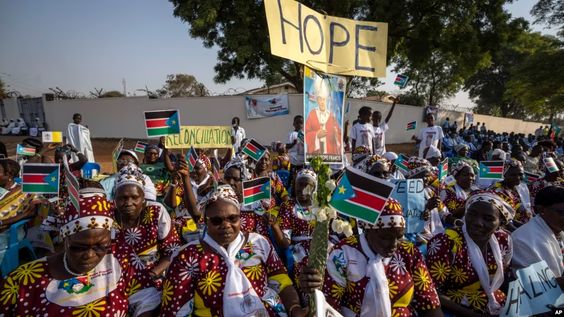Africa
UN calls on South Sudan to move closer to elections

On Tuesday, the senior UN representative in South Sudan encouraged the nation’s authorities to quicken the implementation of the 2018 Revitalized Peace Agreement, including conducting elections late in 2019.
Nicholas Haysom, head of the U.N. Mission in South Sudan, told the U.N. Security Council, “Now is not the time to take our eyes off the ball in South Sudan.” What Sudan teaches us is just how fast hard-won peace victories may fall apart.
For the youngest nation in the world, this is a crucial year. The first national elections, slated for December 2024, must be prepared for and a new constitution must be written.
According to Haysom, the process of creating the constitution is ten months behind schedule, the planning for the elections is eight months behind schedule, and various components of the transitional security arrangements are in limbo.
He asserted that South Sudan might make up ground in its election preparations. In order to create the National Elections Commission, he asked lawmakers to adopt the National Elections Act in parliament.
South Sudan entered a more than five-year civil conflict after gaining independence from Sudan in July 2011 as soldiers loyal to President Salva Kiir battled backers of Vice President Riek Machar.
The war claimed the lives of thousands, and more than 2 million people fled to other nations, notably Sudan. More than 117,000 individuals have crossed back into South Sudan in search of safety since mid-April, when a rivalry between two Sudanese generals descended into open conflict. 93% of them, according to Haysom, are South Sudanese coming home.
The South Sudanese administration, Haysom stated, “deserves praise for its open border policy to all those who are escaping the conflict, with or without travel documents.” “However, with limited local resources and bottlenecks of arrivals in South Sudan’s border towns, particularly in Renk, the capacity of the government and humanitarians to absorb refugees is under strain.”
In South Sudan, at least 9.4 million people required humanitarian aid prior to the start of the conflict in Sudan. With the returns, that number is most likely to increase.
Haysom pointed out that South Sudan’s economy is also being impacted by the violence in Sudan because numerous imports from its northern neighbor have been disrupted, raising prices. The economy of South Sudan is reliant on oil exports, which, as highlighted by Haysom, leave the country through Port Sudan. The economy could suffer greatly if they are interrupted.
